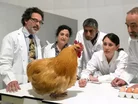Why are UK poultry recalls at a 10-year high?

Amid controversy over poisonous eggs travelling around Europe and the ongoing UK-US chicken chlorine saga, new research has uncovered another issue within Britain’s poultry industry.
Recalls of chicken and other poultry meats are at their highest level since 2002 according to a report from Stericycle ExpertSOLUTIONS, just as it was revealed that chicken has overtaken red meat as the most popular meat in Britain.
With traditional ‘meat and two veg’ meals, based on red meat, falling out of fashion and more people dining alone, the versatility of fresh poultry has seen sales soar in recent years. However, the recall report published today shows that, of those poultry products that have been recalled, as many as nine out of 10 may contain dangerous and potentially deadly bacteria.
The rise in poultry recalls is directly linked to the recent curtailing by the EU of meat imports from Brazil after exporters allegedly bribed inspectors to overlook practices including the processing of rotten meat, shipping product with salmonella traces, and failing to carry out inspections.
The Stericycle Q2 2017 Recall and Notification Index reveals that there were 223 recalls of poultry products last quarter, with bacterial contamination behind more than 93% of unsafe poultry meat withdrawals. Salmonella was mainly responsible for poultry contamination, and this can lead to serious health risks particularly among pregnant women, infants and the elderly. Amongst other food recalls, aflatoxins play a significant role, and can affect the liver, causing acute toxicity. This can occur in food products such as nuts originating in hot, humid countries.
Farzad Henareh, European Vice President at Stericycle ExpertSOLUTIONS, said: “The ongoing investigation of food inspection practices in Brazil continues to have a serious knock-on effect for EU imports. However, recalls relating to food originating from other countries indicates that the industry still needs to employ the most rigorous approach to food safety, and the risks remain high. Adherence to the strict regulatory standards in the EU is an absolute must.”
The Stericycle report indicates that 66.5% of food recalls originated in non-EU countries, with Brazil being the major exporter during the second quarter. Other exporters included India with 68 recalls, Turkey with 60 and China with 51. Spain was the only European country in the top five, with 70 recalls.
Featured Articles
Fresh investment supports TRACT in enhancing tools for sustainability in the food and agricultural sectors, aligning with EU regulations
The devastating floods in Spain have shaken up the global citrus supply, heightening challenges in the fruit juice drinks market
McDonald's has spent 40 years supporting students with scholarships & plans to continue, despite Robert F. Kennedy Jr.’s plan to Make America Healthy Again

